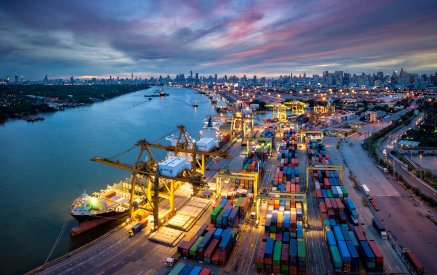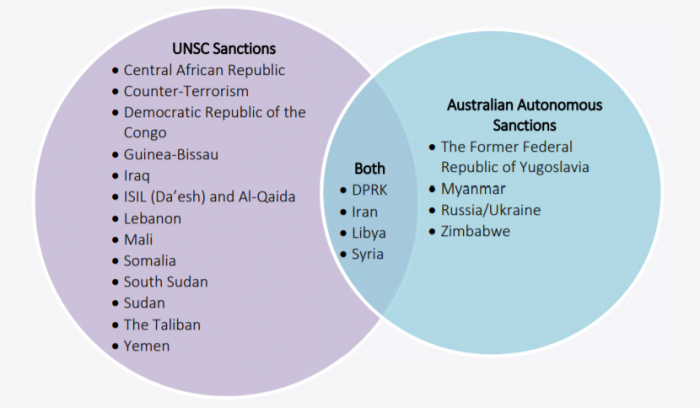DFAT provides a snapshot of the various sanctions regimes in place globally and outlines the reasons that sanctions have been imposed for specific countries and regions.
United Nations Security Council (UNSC) sanctions
As a member of the United Nations, Australia implements all UNSC sanctions by incorporating them into Australian law.
Central African Republic and Democratic Republic of the Congo
The United Nations Security Council (UNSC) has imposed sanctions in relation to the Central African Republic (CAR) and the Democratic Republic of the Congo (DRC) due to widespread insecurity and lack of law and order, as well as human rights abuses by armed groups. There is a focus on specific targets, which include leaders of armed groups and militias.
Guinea-Bissau
In 2012, the UNSC imposed sanctions in relation to Guinea‐Bissau in response to the military seizing power. This sanctions regime imposes a travel ban on 11 senior members of the Guinea‐Bissau military, with those people prohibited from transiting through or entering Australia and other countries adhering to the UNSC sanctions.
Iraq
The UNSC initially imposed various sanctions in relation to Iraq in 1990 in response to its invasion of Kuwait. Whilst some sanctions have since been removed, there are still some sanctions in place such as restrictions on supplying arms or dealing with certain assets.
Lebanon
The UNSC has imposed sanctions on Lebanon in relation to the 2005 terrorist bombing in Beirut, as well as in response to the 2006 conflict between Israel and Hezbollah.
Mali
In 2017, the UNSC imposed sanctions on Mali in response to its insecurity and breach of the country’s Agreement on Peace and Reconciliation (Agreement). Three individuals who were involved in obstructing the implementation of the Agreement were designated for this agreement. This demonstrates the specificity with which sanctions may be imposed.
Somalia
In 1992, the UNSC imposed sanctions relating to the conflict in Somalia, which saw heavy loss of life and widespread damage.
Sudan and South Sudan
The UNSC imposes sanctions in relation to the ongoing humanitarian crisis and widespread human rights violations in Sudan and South Sudan.
Yemen
The UNSC imposes sanctions on Yemen in response to its ongoing political, security, economic and humanitarian challenges.
Anti-terrorism sanctions
In addition to country and region-specific sanctions, the UNSC imposes a number of sanctions designed to target the global terrorism threat. As per the above, these sanctions are incorporated into Australian law.
Counter-terrorism
In response to the US terrorist attacks on 11 September 2001, the UNSC resolved to suppress terrorism by implementing targeted financial sanctions in relation to persons involved in terrorist activities. As a UN member state, Australia is required to oblige by this resolution (Resolution 1373).
Australia can designate a person or entity who is somehow involved in terrorism acts or financing, making it an offence to provide or deal with the assets of the relevant designated individual/entity.
ISIL and Al-Qaida
The UNSC sanctions regime concerning ISIL and Al-Qaida is implemented by Australia as part of the global effort to fight terrorism and promote international peace and security.
The Taliban
Australia implements the UNSC Taliban sanctions regime into domestic law to promote the peace, stability and security of Afghanistan.
UNSC and Australian Autonomous Sanctions
For the following countries, Australia incorporates UNSC sanctions into domestic law, as well as implementing its own complementary autonomous sanctions.
Democratic People’s Republic of Korea (DPRK)
The UNSC imposed sanctions in response to the DPRK’s nuclear test on 9 October 2006. Additionally, Australia imposed autonomous sanctions in relation to the DPRK, in response to concerns about the nature of the DPRK’s nuclear, WMD and proliferation programs. These autonomous sanctions complement the UNSC sanctions.
Iran
Between 2006 and 2010, the UNSC imposed sanctions on Iran in response to its refusal to suspend its uranium enrichment program. Additionally, Australia imposes complementary autonomous sanctions.
Libya
In 2011, the UNSC imposed sanctions in relation to Libya in response to the violence and use of armed force against civilians in Libya and the systemic violations of human rights by the former Qadhafi regime. Australia also imposes autonomous sanctions in relation to Libya, which complement the UNSC sanctions regime.
Syria
Since 2011, Australia has imposed autonomous sanctions in relation to Syria in response to its concern at the Syrian regime’s use of violence against its people. Australia also gives effect to UNSC Resolution 2199, which prohibits the trade in cultural property that has been illegally removed from Syria.
Australian Autonomous Sanctions (non-UNSC)
A number of countries do not have sanctions imposed by the UNSC, however Australia implements autonomous sanctions to address conduct that is contrary to Australian foreign policy.
Australia has imposed autonomous sanctions in relation to the FFRY which target persons involved in the commission of war crimes during the Balkan wars in the early 1990s.
Myanmar
Australia imposed autonomous sanctions in relation to Myanmar in response to the failure of its Government to recognise the victory of the National League for Democracy in the 1990 Myanmar elections.
New sanctions were issued in 2018 on members of the Myanmar military, in response to human rights abuses it was shown to have committed against ethnic minorities.
Russia/Ukraine
Since 2014, Australia has imposed autonomous sanctions on Russia in response to its threat to the sovereignty and territorial integrity of Ukraine.
Zimbabwe
Australia imposed autonomous sanctions in relation to Zimbabwe in 2002, reflecting concerns about political violence and human rights violations.
Key takeaways
Sanctions provide an effective mechanism to respond to situations of global concern such as human rights abuses and violent conflict, without resulting to armed force. As a member of the UN, Australia implements all United Nations Security Council (UNSC) sanctions, as well as implementing its own autonomous sanctions. Australian autonomous sanctions may complement the UNSC sanctions in certain areas, or act to address matters contravening Australia’s foreign policy that are not covered by UNSC sanctions.




